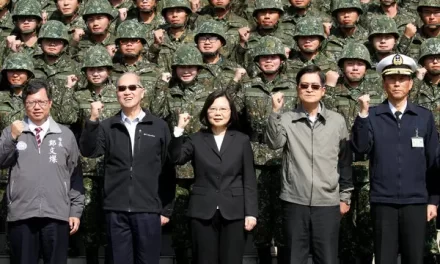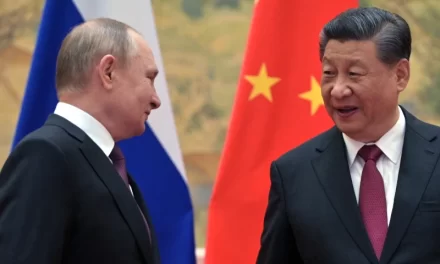BY BRADLEY A. THAYER AND LIANCHAO HAN
As American voters prepare to cast their ballots in the November presidential election, they must keep the People’s Republic of China in mind since the next president’s policies toward Beijing will have a profound impact on the American economy and American workers — and could determine the future of the free world.
Like it or not, the U.S. is going to have to confront China. The ideology of the Chinese Communist Party (CCP) will compel this. The CCP is determined to disrupt the liberal international order, and would rewrite international rules and challenge democratic systems, with the intent to dominate the world. It believes that Western democracy must be destroyed, and that communism’s victory is inevitable.
This secular predestination of Chinese Communism is now evinced in Party Chairman Xi Jinping’s determination to build socialism with Chinese characteristics and to revitalize the Chinese nation. He seeks to expand the Belt and Road Initiative, and has advanced a new strategic narrative, the “Community of Common Destiny,” to gain the support of people around the world and achieve leadership in the community of nations, supplanting the United States. Fundamentally, these measures seek to advance the hegemony of the People’s Republic — something that is embedded in the CCP’s DNA.
In the 1950s, China’s dictator Mao Zedong fought for the leadership of the Third World with Soviet leader Nikita Khrushchev. When the Soviet Union collapsed in the 1990s, a group of leaders from the CCP’s top echelon urged then-leader Deng Xiaoping to lead the communist community. However appealing, Deng argued that China was too vulnerable, the time was not propitious. Instead, he favored his strategy to “hide our capabilities and bide our time.” As China expanded its global markets and obtained the West’s technologies, its power increased rapidly.
Indeed, after the 2008 financial crisis, China might have thought that its time had arrived, but under Xi it is certain that it has, thus defining Xi’s “wolf warrior” style expansion.
Since Xi took office in the end of 2012, he has pursued a form of imperialism — albeit socialist imperialism, militarism and totalitarian rule — much like the Soviet Union, Imperial Japan, Italy, and Nazi Germany did prior to World War II. Domestically, Xi crushes any dissent and political rivals in imposing communist ideology to the Chinese people. His treatment of people in China indicates how he might rule the world, if given the chance.
Beijing’s treatment of religion is a telling example. Because religion offers an alternative belief system, the CCP perceives religious freedom as an existential threat to its regime, particularly in Xinjiang and Tibet. It utilizes repressive measures to terrorize, indoctrinate and assimilate China’s ethnic religious populations to alter their faiths, views and behavior. Xi has put millions of people in re-education camps, banned the use of ethnic languages in schools, coerced ethnic minority women to marry Han men, forced sterilization of ethnic minority women, and pushed ethnic peoples from their ancestral land, trafficking them to work as cheap labor.
The CCP can police its population effectively and cheaply because of its ubiquitous hi-tech surveillance system that watches everyone for any trace of defiance, and its many gulags and prisons. China is committing cultural genocide to create one party, one nation, one ethnicity, one ideology, one culture.
This is also Xi’s vision and ambition for the world, which he has begun to put into practice. The CCP has dispatched and recruited spies and propagandists to take advantage of the U.S. and other Western free markets, and exploit our openness. Their intent is to infiltrate our country, steal economic and technological secrets, influence U.S. politics, and fool Americans into believing that China is a benign and peaceful great power.
The CCP has tried to do the same globally through its Belt and Road Initiative, a multifaceted expansion backed by its military. China’s militarization of the South China Sea and its aggressive push into Arctic affairs show Beijing is a destabilizing force, continuously attempting to change the status quo.
Americans must bear in mind that the next few years represent Xi’s strategic window of opportunity, during which China will prepare for the “great struggle” against the U.S. to ensure that Chinese socialism advances towards victory. No matter who wins the U.S. election, America faces a very real danger from China’s totalitarian regime. We have no choice but to come up with a grand strategy to eliminate the communist threat and defend our democracy and way of life. In addition to battling the Chinese government, we must try to engage with the Chinese people, particularly young people, to nurture reform forces within the CCP.
One of the Bolsheviks’ leaders, Leon Trotsky, purportedly said, “You may not be interested in war, but war may be interested in you.” This should be amended for the present context: “Americans may not be interested in China’s ideology, but it is interested in Americans.”
If America does not take effective measures to counter China now, it will become an unstoppable force. American voters must recognize that the People’s Republic will play a larger, unwelcome and increasingly intrusive part in their lives if not stopped by the United States and its allies.
This article first appeared in The Hill on 10/15/20 5:00 PM ET



















